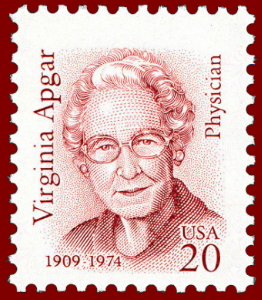Going to Bat for Newborns
On June 7, 1909, American obstetric anesthesiologist Dr. Virginia Apgar was born in New Jersey. She was a leader in the fields of anesthesiology and teratology, and effectively founded the field of neonatology.

At a time when fetal monitors had not been invented, she developed the first standardized method for evaluating a newborn’s transition to life outside the womb – the Apgar Score – now used around the world. Simple, short, and quick to use, Dr. Apgar’s evaluation chart has drastically reduced infant mortality. The assessment is taken at one minute to help a doctor decide whether a baby needs immediate medical help. The evaluation is repeated at five minutes to assess the baby’s response to any initial medical intervention and if further medical assistance is required. It rates a baby’s appearance, pulse, responsiveness, muscle activity, and breathing in an easy-to-remember manner by thinking of the letters in the name Apgar:
- Activity (muscle tone)
- Pulse (heart rate)
- Grimace (reflex irritability)
- Appearance (skin complexion)
- Respiration (breathing).
Witty, charismatic, and tireless, Dr. Apgar was a researcher, medical officer, and fundraiser for the March of Dimes. She created educational programs and publications, appeared before committees, oversaw millions of dollars of research funding, and counselled government and medical decision-makers.
You can catch a little of Dr. Apgar’s quickness and humour in this 1973 television clip as she receives LHJ’s Woman of the Year in Science and Research.
The American Academy of Pediatrics gives the annual Virginia Apgar Award in Perinatal Pediatrics to an individual whose career has had a continuing influence on the well-being of newborn infants.
At Columbia University College of Physicians and Surgeons, the Virginia Apgar Academy of Medical Educators promotes, rewards, and supports outstanding education for the college’s medical students, residents, fellows, and faculty. College faculty who have been on faculty for at least five years can apply for Apgar Academy membership. Following Apgar’s preeminent example, membership recognizes not only educator excellence but also committed contribution to the educational life of the college medical community.
B Bondar / Real World Content Advantage